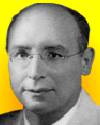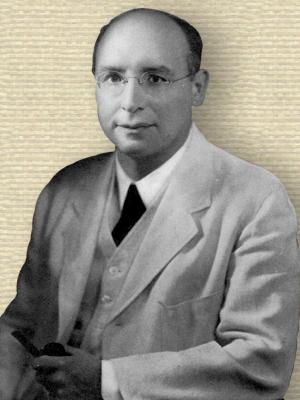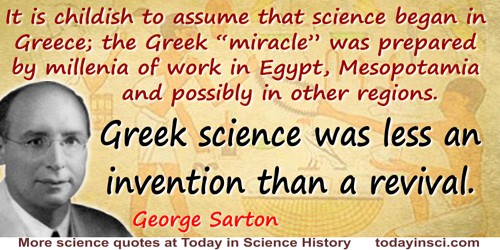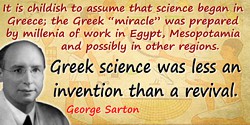 (source)
(source)
|
George Sarton
(31 Aug 1884 - 22 Mar 1956)
Belgian-American science historian who established the discipline of the History of Science in the U.S. His major work was the several volumes of Introduction to the History of Science (1927-47).
|
Science Quotes by George Sarton (34 quotes)
Abstract as it is, science is but an outgrowth of life. That is what the teacher must continually keep in mind. … Let him explain … science is not a dead system—the excretion of a monstrous pedantism—but really one of the most vigorous and exuberant phases of human life.
— George Sarton
In 'The Teaching of the History of Science', The Scientific Monthly (Sep 1918), 195-196.
Disused methods, cleverly modified, may be rendered efficient again. When it is understood in this way, the history of science becomes really a research method. A great scientist of our own
time, Ostwald, has even gone so far as to say that “It is nothing but a research method.”
— George Sarton
In 'The History of Science', The Monist (July 1916), 26, No. 3, 344.
Each new scientific development is due to the pressure of some social need. Of course … insatiable curiosity … is still nothing but a response either to an old problem of nature, or to one arising from new social circumstances.
— George Sarton
In 'The Teaching of the History of Science', The Scientific Monthly (Sep 1918), 194.
Hellenic science is a victory of rationalism, which appears greater, not smaller, when one is made to realize that it had been won in spite of the irrational beliefs of the Greek people; all in all, it was a triumph of reason in the face of unreason. Some knowledge of Greek superstitions is needed not only for a proper appreciation of that triumph but also for the justification of occasional failures, such as the many Platonic aberrations.
— George Sarton
In A History of Science: Volume 1: Ancient Science Through the Golden Age of Greece (1952), ix.
Humanities are inseparable from human creations, whether these be philosophic, scientific, technical, or artistic and literary. They exist in everything to which men have imparted their virtues or vices, their joys or sufferings. There are blood and tears in geometry as well as in art, blood and tears but also innumerable joys, the purest that men can experience themselves or share with others.
— George Sarton
In A History of Science: Hellenistic Science and Culture in the Last Three Centuries B.C. (1959), ix.
It is childish to assume that science began in Greece; the Greek “miracle” was prepared by millenia of work in Egypt, Mesopotamia and possibly in other regions. Greek science was less an invention than a revival.
— George Sarton
In A History of Science: Volume 1: Ancient Science Through the Golden Age of Greece (1952), ix.
It would be foolish to give credit to Euclid for pangeometrical conceptions; the idea of geometry deifferent from the common-sense one never occurred to his mind. Yet, when he stated the fifth postulate, he stood at the parting of the ways. His subconscious prescience is astounding. There is nothing comperable to it in the whole history of science.
— George Sarton
Ancient Science And Modern Civilization (1954, 1959), 28. In George Edward Martin, The Foundations of Geometry and the Non-Euclidean Plane (1982), 130.
Men of science have made abundant mistakes of every kind; their knowledge has improved only because of their gradual abandonment of ancient errors, poor approximations, and premature conclusions.
— George Sarton
In A History of Science: Volume 2: Hellenistic Science and Culture in the Last Three Centuries B.C. (1959), xi.
No history of civilization can be tolerably complete which does not give considerable space to the explanation of scientific progress. If we had any doubts about this, it would suffice to ask ourselves what constitutes the essential difference between our and earlier civilizations. Throughout the course of history, in every period, and in almost every country, we find a small number of saints, of great artists, of men of science. The saints of to-day are not necessarily more saintly than those of a thousand years ago; our artists are not necessarily greater than those of early Greece; they are more likely to be inferior; and of course, our men of science are not necessarily more intelligent than those of old; yet one thing is certain, their knowledge is at once more extensive and more accurate. The acquisition and systematization of positive knowledge is the only human activity which is truly cumulative and progressive. Our civilization is essentially different from earlier ones, because our knowledge of the world and of ourselves is deeper, more precise, and more certain, because we have gradually learned to disentangle the forces of nature, and because we have contrived, by strict obedience to their laws, to capture them and to divert them to the gratification of our own needs.
— George Sarton
Introduction to the History of Science (1927), Vol. 1, 3-4.
One of the petty ideas of philosophers is to elaborate a classification, a hierarchy of sciences. They all try it, and they are generally so fond of their favorite scheme that they are prone to attach an absurd importance to it. We must not let ourselves be misled by this. Classifications are always artificial; none more than this, however. There is nothing of value to get out of a classification of science; it dissembles more beauty and order than it can possibly reveal.
— George Sarton
In 'The Teaching of the History of Science', The Scientific Monthly (Sep 1918), 194.
The artist admires the work of his forerunners, but the scientist does more than admire, he makes actual use of it. The artist may find an inspiration in it, but the scientist tries to incorporate it entirely in his own work.
— George Sarton
In 'The History of Science', The Monist (July 1916), 26, No. 3, 340.
The best instrument of synthesis, and the most natural hyphen between scientist and philosopher is the history of science.
— George Sarton
In 'The History of Science', The Monist (July 1916), 26, No. 3, 330.
The chemist and the engineer have a vital interest in knowing the processes that have fallen into disuse, but to which the very progress of science may give from one day to the next a new career. The history of science is to them, so to say, what forsaken mines are to the prospector.
— George Sarton
In 'The History of Science', The Monist (July 1916), 26, No. 3, 348.
The chief requisite for the making of a good chicken pie is chicken; nay, no amount of culinary legerdemain can make up for the lack of chicken. In the same way, the chief requisite for the history of science is intimate scientific knowledge; no amount of philosophic legerdemain can make up for its absence.
— George Sarton
In 'The Teaching of the History of Science', The Scientific Monthly (Sep 1918), 194.
The development of mathematics is largely a natural, not a purely logical one: mathematicians are continually answering questions suggested by astronomers or physicists; many essential mathematical theories are but the reflex outgrowth from physical puzzles.
— George Sarton
In 'The Teaching of the History of Science', The Scientific Monthly (Sep 1918), 194.
The historian of civilization can no longer remain unacquainted with the history of science.
— George Sarton
In 'The History of Science', The Monist (July 1916), 26, No. 3, 335.
The historical order is very interesting, but accidental and capricious; if we would to understand the growth of knowledge, we cannot be satisfied with accidents, we must explain how knowledge was gradually built up.
— George Sarton
In A History of Science: Volume 1: Ancient Science Through the Golden Age of Greece (1952), xi.
The history of science … familiarizes us with the ideas of evolution and the continuous transformation of human things; … it shows us that if the accomplishments of mankind as a whole are grand the contribution of each is small.
— George Sarton
In 'The History of Science', The Monist (July 1916), 26, No. 3, 353.
The history of science gives us the materials of an evolution of human intellect, so one could look in the history of the arts and of literature for the story of the evolution of human sensibility. The history of science is a history of ideas; just so the history of art could be considered as a history of man’s dreams.
— George Sarton
In 'The History of Science', The Monist (July 1916), 26, No. 3, 342.
The history of science is accomplishing an endless purification of scientific facts and ideas.
— George Sarton
In 'The History of Science', The Monist (July 1916), 26, No. 3, 350.
The history of science is constantly interwoven with the history of technology, and … it is impossible to separate one from the other.
— George Sarton
In 'The History of Science', The Monist (July 1916), 26, No. 3, 336.
The history of science is the history of mankind’s unity, of its sublime purpose, of its gradual redemption.
— George Sarton
In Introduction to the History of Science (1927), Vol. 1, 32.
The history of science is the study of the development of science—just as one studies the development of a plant or an animal—from its very birth.
— George Sarton
In 'The History of Science', The Monist (July 1916), 26, No. 3, 321.
The history of science should be the leading thread in the history of civilization.
— George Sarton
In 'The History of Science', The Monist (July 1916), 26, No. 3, 340.
The history of science should not be an instrument to defend any kind of social or philosophic theory; it should be used only for its own purpose, to illustrate impartially the working of reason against unreason, the gradual unfolding of truth, in all its forms, whether pleasant or unpleasant, useful of useless, welcome or unwelcome.
— George Sarton
In A History of Science: Volume 1: Ancient Science Through the Golden Age of Greece (1952), xiv.
The main duty of the historian of mathematics, as well as his fondest privilege, is to explain the humanity of mathematics, to illustrate its greatness, beauty and dignity, and to describe how the incessant efforts and accumulated genius of many generations have built up that magnificent monument, the object of our most legitimate pride as men, and of our wonder, humility and thankfulness, as individuals.
— George Sarton
In The Study of the History of Mathematics (1936), 28.
The mathematical universe is already so large and diversified that it is hardly possible for a single mind to grasp it, or, to put it in another way, so much energy would be needed for grasping it that there would be none left for creative research. A mathematical congress of today reminds one of the Tower of Babel, for few men can follow profitably the discussions of sections other than their own, and even there they are sometimes made to feel like strangers.
— George Sarton
In The Study Of The History Of Mathematics (1936), 14.
The most ominous conflict of our time is the difference of opinion, of outlook, between men of letters, historians, philosophers, the so-called humanists, on the one side and scientists on the other. The gap cannot but increase because of the intolerance of both and the fact that science is growing by leaps and bounds.
— George Sarton
In The History of Science and the New Humanism (1931), Vol. 1, 69.
The most ominous conflict of our time is the difference of opinion, of outlook, between men of letters, historians, philosophers, the so-called humanists, on the one side and scientists on the other. The gap cannot but increase because of the intolerance of both and the fact that science is growing by leaps and bounds.
— George Sarton
The History of Science and the New Humanism (1931), 69.Omnious;Conflict;Difference;Opinion;Outlook;Men OfLetters;Historian;Philosopher;Humanist;So-Called;Scientist;Gap;Intolerance;Fact;Growth;Leap;Bound
The purpose of the history of science is to establish the genesis and the development of scientific facts and ideas, taking into account all intellectual exchanges and all influences brought into play by the very progress of civilization. It is indeed a history of civilization considered from its highest point of view. The center of interest is the evolution of science, but general history remains always in the background.
— George Sarton
In 'The History of Science', The Monist (July 1916), 26, No. 3, 333.
The study of the history of mathematics will not make better mathematicians but gentler ones, it will enrich their minds, mellow their hearts, and bring out their finer qualities.
— George Sarton
In The Study of the History of Mathematics (1936), 28.
The working of mines has always exerted such a deep influence on the evolution of science and civilization that one might compare the importance of mines in the history of science with that of temples in the history of art.
— George Sarton
In 'The History of Science', The Monist (July 1916), 26, No. 3, 337.
There are but few saints among scientists, as among other men, but truth itself is a goal comparable to sanctity. As the Pythagoreans had already understood it more than twenty-four centuries ago, there is sanctity in pure knowledge, as there is in pure beauty, and the disinterested quest of truth is perhaps the greatest purification.
— George Sarton
In The History of Science and the New Humanism (1987), 46-47.
When truth is made subservient to anything else, however great (say religion), it becomes impure and sordid.
— George Sarton
In A History of Science: Volume 1: Ancient Science Through the Golden Age of Greece (1952), xi.
See also:
- 31 Aug - short biography, births, deaths and events on date of Sarton's birth.
- The Study of the History of Mathematics & the Study of the History of Science, by George Sarton. - book suggestion.
- Booklist for George Sarton.



 In science it often happens that scientists say, 'You know that's a really good argument; my position is mistaken,' and then they would actually change their minds and you never hear that old view from them again. They really do it. It doesn't happen as often as it should, because scientists are human and change is sometimes painful. But it happens every day. I cannot recall the last time something like that happened in politics or religion.
(1987) --
In science it often happens that scientists say, 'You know that's a really good argument; my position is mistaken,' and then they would actually change their minds and you never hear that old view from them again. They really do it. It doesn't happen as often as it should, because scientists are human and change is sometimes painful. But it happens every day. I cannot recall the last time something like that happened in politics or religion.
(1987) -- 


